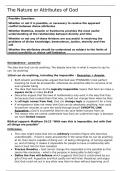Other
Religious Studies OCR A level Philosophy Year 2: The Nature or Attributes of God detailed summary and evaluation booklet with lots of scholars
- Course
- Institution
This 17-page booklet includes every single argument/scholar/piece of information you need to know for the topic AND includes synoptic links which are absolutely essential to achieve an A*. I only used this booklet to revise for my A level and got an A*! What's inside: - Possible practice quest...
[Show more]



